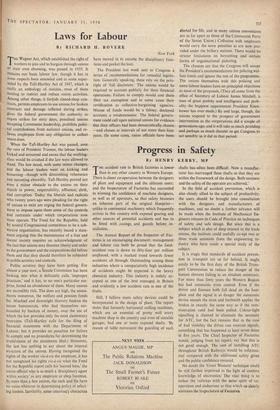Laws for Labour
By RICHARD. H. ROVERE THE Wagner Act, which established the right of workers to join and to bargain through unions of their own choosing, was passed in 1935. It remains our basic labour law, though it has in some respects been amended and in some super- seded by the Taft-Hartley Act of 1947, which is .really an anthology of statutes, most of them tending to restrict and reduce union activities. Among other things, it forbids closed-shop con- tracts, permits employers to sue unions for broken • Contracts and damage inflicted during strikes, gives the federal government the authority to enjoin strikes for sixty days, penalised unions accepting Communist leadership, prohibits politi- cal contributions from national unions, and re- lieves employers from any obligation to collect union dues.
When the Taft-Hartley Act was passed, over the veto of President Truman, the labour leaders kicked and screamed and swore that the working- class would be crushed if the law were allowed to stand. The law stood, with some minor changes, and the labour leaders went on kicking and screaming—though with diminishing vehemence and mounting absurdity. Taft-Hartley proved not even a minor obstacle to the unions on their . march to power, respectability, affluence, sloth, and corruption. Today the libeials and radicals who twenty years ago were pleading for the right of unions to exist are urging the federal govern- ' ment to impose upon them some of the controls ' and restraints under which corporations now must operate. The Fund for the Republic, held by several Congressional committees to be a sub- . versive organisation, has recently issued a state- ment arguing that the' maintenance of a free and decent society requires an, acknowledgment of the fact that unions may threaten liberty and order as the government and the corporations did before them and that they should therefore be subjected to public scrutiny and controls.
Public, scrutiny they have been getting. For almost a year now, a senate Committee has been looking into what it delicately .calls 'improper practices,' and it has, to no one's particular sur- prise, found an abundance of them. Many unions are incredibly rich. The dues are high, the assess- ments numerous, the welfare and pension funds fat. Mischief and downright thievery beckon the union bureaucrats, who find themselves, sur- rounded by buckets of money, over 'the use of Which the law provides only the most elementary restraints. (Taft-Hartley calls for the filing of financial statements with the Department of Labour, but it provides no penalties for failure to comply and no procedures for determining the truthfulness of the statements filed.) Moreover, the law has nothing to say about the internal structure. of . the unions. Having recognised the rights of the worker vis-a-vis the employer, it has not recognised his rights vis-a-vis what the Fund for the Republie report calls his 'second boss,', the union official who is as much a 'disciplinary agent withinsociety' as any employer or shop foreman. In more than a few unions, the rank and file have no voice whatever in determining policy or select- ing leaders. Inevitably, some unsavoury characters New York have moved in to assume the disciplinary func- tions and pocket the loot.
The President last week sent to Congress a series of recommendations for remedial legisla- tion. Generally speaking, these rely on the prin- ciple of 'full disclosure.' The unions would be required to account publicly for their financial operations.- Failure to comply would cost them their tax exemption and in some cases their certification as collective-bargaining agencies. Misuse of funds would be a felony, doctored accounts a misdemeanour. The federal govern- ment could call upon national unions for evidence that their officers had been democratically chosen —and chosen at intervals of not more than four years. (In some cases, union officials have been elected for life, and in many unions conventions are as far apart as those of the Communist Party of the Soviet Union.) Collusion with employers would carry the same penalties as are now pro- vided under the bribery statutes. There would be stricter limitations on boycotting and certain forms of organisational picketing.
The chances are that the Congress will accept the President's recommendations for policing, wel- fare funds and ignore the rest of the programme.. The unions themselves wish this policing and some labour leaders have no principled objections to most of the proposals. (They all come from the office of Secretary of Labour James Mitchell, a man of great probity and intelligence and prob- ably the happiest appointment President Eisen- hower has ever made.) By and large, though, the unions respond to the prospect of government intervention as the corporations did a couple of generation&ago, and it. ill take.as much prodding and perhaps as much disaster to get Congress to act sensibly as it did in that period.






































 Previous page
Previous page